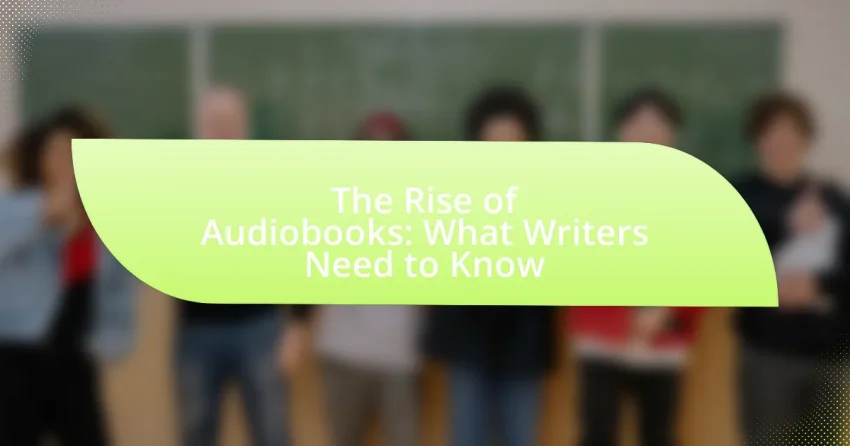The article focuses on the rise of audiobooks, highlighting their increasing popularity and the factors driving this trend, such as convenience and technological advancements. It details the evolution of audiobooks from vinyl records to digital formats, emphasizing the significant growth in sales and consumer behavior shifts. Additionally, the article addresses the challenges writers face in the audiobook market, including production costs and competition, while providing insights on effective marketing strategies and best practices for audiobook creation. Key considerations for writers include understanding audience preferences, selecting quality narrators, and leveraging social media for promotion.

What is the Rise of Audiobooks?
The rise of audiobooks refers to the significant increase in popularity and consumption of audio versions of books, particularly over the last decade. This trend is evidenced by a 2021 report from the Audio Publishers Association, which indicated that audiobook sales in the United States reached $1.3 billion, marking a 25% increase from the previous year. Factors contributing to this rise include the convenience of listening during commutes, the growth of smartphone usage, and the availability of subscription services like Audible. Additionally, the COVID-19 pandemic accelerated this trend as more individuals sought alternative forms of entertainment while staying at home.
How have audiobooks evolved over the years?
Audiobooks have evolved significantly from their inception in the early 20th century to the present day. Initially, audiobooks were produced on vinyl records and cassette tapes, primarily aimed at visually impaired individuals. With the advent of digital technology in the late 1990s, audiobooks transitioned to CDs, making them more accessible to the general public. The introduction of MP3 players and smartphones in the 2000s further revolutionized the format, allowing users to download and listen to audiobooks on-the-go. According to the Audio Publishers Association, the audiobook market has seen consistent growth, with sales increasing by over 20% annually since 2015, indicating a rising consumer preference for this format. Today, streaming services and subscription models have made audiobooks even more accessible, allowing listeners to enjoy a vast library of titles at their convenience.
What technological advancements have influenced audiobook production?
Technological advancements such as digital recording, editing software, and distribution platforms have significantly influenced audiobook production. Digital recording technology allows for high-quality audio capture, while advanced editing software enables precise manipulation of sound, improving overall production quality. Additionally, distribution platforms like Audible and Google Play have streamlined the process of getting audiobooks to consumers, expanding market reach and accessibility. These advancements have collectively transformed the audiobook industry, making production more efficient and enhancing listener experience.
How has consumer behavior changed regarding audiobooks?
Consumer behavior regarding audiobooks has shifted significantly towards increased adoption and consumption. This change is evidenced by a 2021 report from the Audio Publishers Association, which indicated that 50% of Americans aged 18 and older have listened to an audiobook, up from 44% in 2020. Additionally, the average number of audiobooks consumed per listener rose to 8.3 in 2021, compared to 7.1 in the previous year. This trend reflects a growing preference for the convenience of audiobooks, as consumers increasingly seek flexible and accessible ways to engage with literature while multitasking or commuting.
Why are audiobooks becoming increasingly popular?
Audiobooks are becoming increasingly popular due to their convenience and accessibility. With the rise of smartphones and streaming services, consumers can easily listen to books while multitasking, such as during commutes or workouts. According to a 2021 report by the Audio Publishers Association, audiobook sales in the U.S. reached $1.3 billion, reflecting a 25% increase from the previous year. This growth indicates a significant shift in consumer behavior, as more people are opting for audio formats over traditional print or e-books.
What demographic trends are driving audiobook consumption?
Audiobook consumption is primarily driven by younger demographics, particularly Millennials and Gen Z, who favor digital content and multitasking. According to a 2021 report by the Audio Publishers Association, 55% of audiobook listeners are under the age of 35, indicating a strong preference for audio formats among younger audiences. Additionally, the rise of mobile technology and streaming services has made audiobooks more accessible, further contributing to their popularity among these age groups. The trend is also supported by the increasing integration of audiobooks into daily routines, such as commuting and exercising, which aligns with the lifestyle of younger consumers who seek convenience and flexibility in their media consumption.
How do audiobooks fit into modern lifestyles?
Audiobooks seamlessly integrate into modern lifestyles by providing a flexible and convenient way to consume literature. With the increasing pace of life, many individuals find it challenging to dedicate time to reading physical books; audiobooks allow them to engage with stories and information while multitasking, such as during commutes, workouts, or household chores. According to a 2021 survey by the Audio Publishers Association, 55% of audiobook listeners reported that they enjoy the format because it fits into their busy schedules, highlighting its role in enhancing accessibility to literature in a fast-paced world.
What challenges do writers face in the audiobook market?
Writers face several challenges in the audiobook market, including competition from established authors and narrators, the need for high-quality audio production, and the complexities of distribution and rights management. The audiobook industry is growing rapidly, with sales reaching $1.3 billion in 2020, leading to increased competition as more writers enter the space. Additionally, producing a professional-quality audiobook requires investment in recording equipment or hiring skilled narrators, which can be a financial burden for some authors. Furthermore, navigating the legal aspects of audiobook rights and distribution channels can be complicated, as writers must ensure they retain appropriate rights while also reaching audiences through platforms like Audible and Google Play.
What are the common misconceptions about audiobooks among writers?
Common misconceptions about audiobooks among writers include the belief that audiobooks are a lesser form of literature, that they do not reach a wide audience, and that they are not profitable. Many writers think audiobooks lack literary value compared to print or e-books; however, the audiobook market has grown significantly, with sales reaching over $1.3 billion in 2020, indicating a strong appreciation for the format. Additionally, writers often underestimate the audience for audiobooks, as research shows that 55% of audiobook listeners are under 35 years old, expanding the demographic reach. Finally, the misconception that audiobooks are not financially rewarding is contradicted by the fact that authors can earn royalties from audiobook sales, which can be substantial, especially as the format continues to gain popularity.
How can writers overcome barriers to entering the audiobook space?
Writers can overcome barriers to entering the audiobook space by leveraging technology and partnerships. Utilizing platforms like ACX (Audiobook Creation Exchange) allows writers to connect with narrators and producers, simplifying the production process. Additionally, writers can invest in affordable recording equipment or use professional studios to ensure high-quality audio. According to a 2021 report by the Audio Publishers Association, the audiobook market grew by 12% in 2020, indicating a rising demand that writers can tap into by creating engaging content. By understanding the market trends and utilizing available resources, writers can effectively navigate the challenges of entering the audiobook industry.

What do Writers Need to Know About Audiobooks?
Writers need to know that audiobooks are a growing market that offers significant opportunities for reaching new audiences. The audiobook industry has seen a substantial increase in revenue, with the Audio Publishers Association reporting a 12% growth in sales in 2020, reaching $1.3 billion. This growth indicates a rising consumer preference for audio content, which writers can leverage by adapting their works into audiobook formats. Additionally, understanding the production process, including narration, editing, and distribution, is crucial for writers to ensure their audiobooks meet quality standards and resonate with listeners.
How can writers effectively market their audiobooks?
Writers can effectively market their audiobooks by utilizing social media platforms, engaging with their audience, and leveraging audiobook-specific promotional tools. Social media allows writers to share snippets, behind-the-scenes content, and interact with potential listeners, which can increase visibility and interest. Engaging with the audience through live readings or Q&A sessions can create a personal connection, enhancing listener loyalty. Additionally, platforms like Audible and Google Play offer promotional opportunities such as discounts or featured listings, which can significantly boost sales. According to a 2021 report by the Audio Publishers Association, 50% of audiobook listeners discover new titles through recommendations on social media, highlighting the effectiveness of these marketing strategies.
What platforms are best for distributing audiobooks?
The best platforms for distributing audiobooks include Audible, Apple Books, Google Play Books, and Findaway Voices. Audible is the largest audiobook retailer, offering a vast selection and subscription model that attracts millions of users. Apple Books provides access to a large audience of iOS users, while Google Play Books allows distribution to Android users. Findaway Voices offers a wide range of distribution options, including libraries and international markets, making it a versatile choice for authors. These platforms collectively cover a significant portion of the audiobook market, ensuring broad reach and accessibility for authors.
How can social media be leveraged to promote audiobooks?
Social media can be leveraged to promote audiobooks by utilizing targeted advertising, engaging content, and influencer partnerships. Targeted advertising on platforms like Facebook and Instagram allows publishers to reach specific demographics interested in audiobooks, increasing visibility and sales. Engaging content, such as audio snippets, author interviews, and behind-the-scenes looks at the audiobook production process, can capture the audience’s attention and encourage shares. Additionally, partnerships with influencers and audiobook reviewers can amplify reach, as their endorsements can lend credibility and attract their followers to the audiobook. According to a report by the Audio Publishers Association, 50% of audiobook listeners are influenced by social media, highlighting its effectiveness in promoting audiobooks.
What are the key considerations for audiobook production?
Key considerations for audiobook production include selecting the right narrator, ensuring high audio quality, and understanding the target audience. The choice of narrator significantly impacts listener engagement; a narrator’s voice and style must align with the book’s tone and genre. High audio quality is crucial, as poor sound can detract from the listening experience; this involves using professional recording equipment and soundproof environments. Additionally, understanding the target audience helps in tailoring the production style and marketing strategy, ensuring that the audiobook resonates with potential listeners. These factors collectively contribute to the success of an audiobook in a competitive market.
How should writers choose the right narrator for their audiobooks?
Writers should choose the right narrator for their audiobooks by considering the narrator’s voice, style, and ability to convey the tone of the material. A narrator’s voice should match the genre and target audience of the audiobook; for instance, a warm, engaging voice may suit a romance novel, while a more authoritative tone may be appropriate for a non-fiction work. Additionally, the narrator’s experience and skill in character portrayal can enhance the storytelling, making it more immersive for listeners. Research indicates that audiobooks narrated by skilled professionals tend to receive higher ratings and better audience engagement, underscoring the importance of selecting a narrator who can effectively bring the text to life.
What are the best practices for script adaptation from text to audio?
The best practices for script adaptation from text to audio include focusing on clarity, pacing, and engagement. Clarity is essential; scripts should be written in a conversational tone, avoiding complex sentence structures that may confuse listeners. Pacing is crucial; the script should allow for natural pauses and emphasize key points to maintain listener interest. Engagement can be enhanced by incorporating sound effects and varying vocal tones to create a more immersive experience. These practices are supported by industry standards, such as those outlined by the Audio Publishers Association, which emphasize the importance of listener experience in audiobook production.
What financial aspects should writers be aware of?
Writers should be aware of several financial aspects, including royalties, production costs, and market trends. Royalties from audiobooks typically range from 25% to 50% of the sale price, depending on the distribution platform. Production costs can vary significantly, with professional narration and editing potentially costing between $200 to $500 per finished hour. Additionally, understanding market trends is crucial; the audiobook industry has seen a growth rate of over 20% annually, indicating increasing consumer demand. This financial landscape underscores the importance of strategic planning for writers entering the audiobook market.
How do royalties for audiobooks compare to other formats?
Royalties for audiobooks typically range from 25% to 40% of the retail price, which is generally higher than the 10% to 15% royalties for print books and eBooks. This difference is due to the higher production costs associated with audiobooks, which often require professional narrators and sound engineering. For example, Audible, a major audiobook platform, offers authors a royalty rate of 40% for exclusive titles, while traditional publishing contracts for print and eBooks usually provide lower percentages. This structure incentivizes authors to explore audiobook formats as a potentially more lucrative revenue stream.
What are the costs involved in producing an audiobook?
The costs involved in producing an audiobook typically range from $1,000 to $3,000 for a standard-length book. This cost encompasses several key components: hiring a professional narrator, which can cost between $200 to $400 per finished hour; studio time for recording, which may add another $500 to $1,000; and post-production editing, which can range from $300 to $1,000 depending on the complexity of the audio. Additionally, distribution fees may apply if using platforms like Audible or iTunes, which often take a percentage of sales. These figures are supported by industry standards and reports from audiobook production companies, confirming that quality production requires a significant investment.

How Can Writers Succeed in the Audiobook Industry?
Writers can succeed in the audiobook industry by focusing on high-quality narration, understanding their target audience, and leveraging effective marketing strategies. High-quality narration is crucial, as studies show that engaging narrators can significantly enhance listener retention and satisfaction. Writers should also research their audience’s preferences, as the audiobook market has seen a 25% growth in sales from 2020 to 2021, indicating a rising demand for diverse genres and formats. Additionally, utilizing social media and audiobook platforms for marketing can increase visibility; for instance, authors who actively promote their audiobooks on platforms like Instagram and TikTok often see higher sales and engagement.
What strategies can writers implement to enhance their audiobook success?
Writers can enhance their audiobook success by focusing on high-quality narration, effective marketing strategies, and audience engagement. High-quality narration is crucial; studies show that professional narrators can increase listener retention and satisfaction, leading to better sales. Writers should also implement targeted marketing strategies, such as leveraging social media platforms and audiobook-specific promotions, to reach potential listeners effectively. Engaging with the audience through interactive content, like Q&A sessions or behind-the-scenes insights, can foster a loyal listener base and encourage word-of-mouth recommendations.
How can writers build a loyal listener base for their audiobooks?
Writers can build a loyal listener base for their audiobooks by consistently engaging with their audience through social media, newsletters, and interactive platforms. Engaging content, such as behind-the-scenes insights, Q&A sessions, and exclusive previews, fosters a sense of community and connection. Research indicates that authors who actively communicate with their audience can increase listener retention rates by up to 30%. Additionally, offering incentives like discounts or bonus content for loyal listeners can further enhance listener loyalty.
What role does author branding play in audiobook sales?
Author branding significantly influences audiobook sales by establishing a recognizable identity that attracts listeners. A strong author brand fosters trust and loyalty, making consumers more likely to purchase audiobooks from familiar authors. Research indicates that 70% of readers prefer to buy books from authors they know, which directly correlates to increased sales in the audiobook market. Additionally, effective branding strategies, such as consistent messaging and engaging social media presence, can enhance visibility and drive sales, as evidenced by the success of authors like Stephen King and J.K. Rowling, whose established brands contribute to their audiobook sales.
What resources are available for writers interested in audiobooks?
Writers interested in audiobooks can access various resources, including platforms like ACX (Audiobook Creation Exchange), which connects authors with narrators and producers. Additionally, organizations such as the Audio Publishers Association provide industry insights and educational materials. Online courses on platforms like Udemy and Coursera offer training on audiobook production and marketing. Furthermore, books like “The Audiobook Revolution” by David C. Baker provide valuable information on the audiobook industry. These resources collectively support writers in navigating the audiobook landscape effectively.
What organizations or communities support audiobook authors?
Organizations that support audiobook authors include the Audio Publishers Association (APA), which advocates for the audiobook industry and provides resources for authors. Additionally, the Association of Authors’ Representatives (AAR) offers guidance and support for authors, including those in the audiobook sector. The Independent Book Publishers Association (IBPA) also supports audiobook authors by providing educational resources and networking opportunities. These organizations contribute to the growth and development of audiobook authors through advocacy, resources, and community engagement.
How can writers access training or workshops on audiobook production?
Writers can access training or workshops on audiobook production through various online platforms and industry organizations. Websites like Udemy and Coursera offer courses specifically focused on audiobook production, covering aspects such as narration techniques and audio editing. Additionally, organizations like the Audio Publishers Association provide resources and workshops for writers interested in the audiobook industry. These platforms and organizations are recognized for their educational offerings, making them credible sources for writers seeking to enhance their skills in audiobook production.
What are the best practices for creating engaging audiobooks?
The best practices for creating engaging audiobooks include selecting a skilled narrator, ensuring high audio quality, and incorporating sound effects or music when appropriate. A skilled narrator can bring characters to life and enhance the storytelling experience, as evidenced by studies showing that listener engagement increases with professional narration. High audio quality is crucial; poor sound can distract listeners and diminish their enjoyment, with research indicating that clear audio significantly impacts listener retention. Additionally, using sound effects or music can create an immersive experience, as demonstrated by successful audiobooks that utilize these elements to enhance the narrative.
How can writers ensure their audiobooks resonate with listeners?
Writers can ensure their audiobooks resonate with listeners by focusing on engaging narration, relatable content, and high production quality. Engaging narration involves selecting a voice actor whose tone and style match the book’s theme, as studies show that listeners are more likely to connect with narrators who convey emotion and authenticity. Relatable content is crucial; writers should create characters and stories that reflect the experiences and emotions of their target audience, enhancing listener identification. High production quality, including clear audio and professional editing, is essential, as poor sound can detract from the listening experience and lead to negative reviews. These elements combined can significantly increase listener engagement and satisfaction.
What common pitfalls should writers avoid in audiobook creation?
Writers should avoid several common pitfalls in audiobook creation, including neglecting the importance of narration quality, failing to consider the listening audience, and overlooking the need for proper audio editing. High-quality narration is crucial, as poor delivery can detract from the listener’s experience; research indicates that 70% of audiobook listeners prioritize narration style and clarity. Additionally, writers must consider their target audience’s preferences, as content that resonates in print may not translate well to audio. Lastly, inadequate audio editing can lead to distracting background noise or inconsistent volume levels, which can negatively impact listener engagement.
